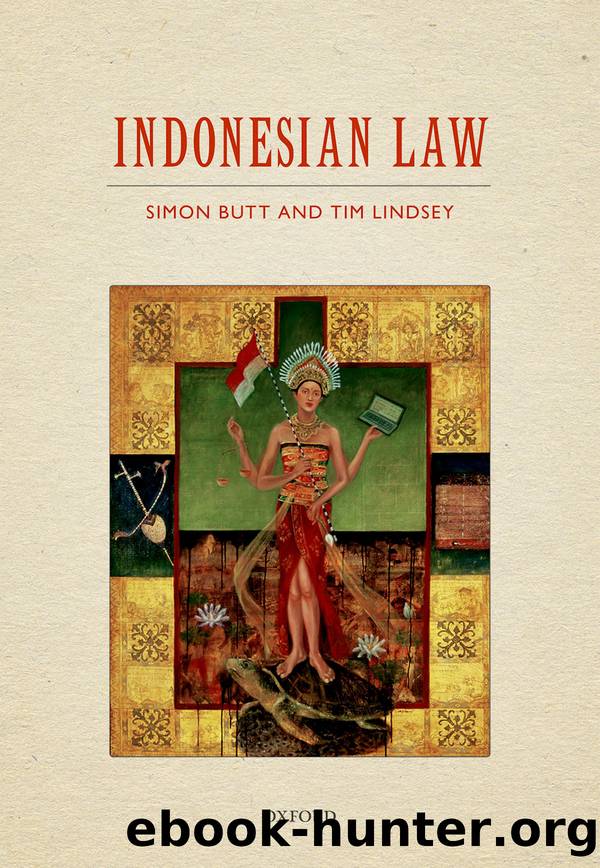Indonesian Law (9780191665578) by Lindsey Tim; Butt Simon

Author:Lindsey, Tim; Butt, Simon
Language: eng
Format: epub
Publisher: Oxford Univ Pr
Published: 2018-12-15T00:00:00+00:00
Clemency application
In March 2010, Corby appealed to President Susilo Bambang Yudhoyono for clemency, claiming that she was suffering from severe mental illness. As noted, the president can grant clemency and rehabilitation under Article 14(1) of the Constitution, which requires that he or she consider the Supreme Courtâs views. Many doubted that Corby would succeed.62 Although the 2002 Clemency Law does not explicitly require the applicant to acknowledge guilt, it does so implicitly. The Law describes clemency as âa gift from the president in the form of forgiveness (pengampunan)â (see General Elucidation). It seems difficult to receive forgiveness without acknowledging wrongdoing or displaying remorse, and Corby refused to do either.
After intense diplomatic activity by Australia, Corby was nonetheless granted clemency on 15 May 2012 by President Yudhoyono, with the passage of Presidential Decision 22/G of 2012. The Supreme Court had been consulted and, on 22 July 2011, had recommended that clemency be granted because Corby: was suffering from severe depression and needed regular psychiatric attention; had no criminal record for drug offences in Australia; and maintained her innocence and claimed that the drugs were placed in her bag by an unknown person.63 The Courtâs mention of her maintaining innocence was unexpected and hard to understand, given that failure to admit oneâs crimes at trial can lead judges to impose heavier criminal sentences.
The decision to grant clemency to an unrepentant Corby was met with a huge backlash from politicians and members of the Indonesian public,64 primarily over concerns that the president was not serious about fighting drugs. The timing of the grant of clemency was also controversial, both in Indonesia and Australia, because it roughly corresponded with Australiaâs release of three young Indonesian men suspected of people smuggling from a prison in Western Australia. Suspicions arose that this release and Corbyâs clemency were part of a secret deal between the two governments.65
An Indonesian NGO known as the National Anti-Narcotics Movement (Granat, which is short for Gerakan Nasional Anti-Narkotika but also means grenade), challenged Corbyâs clemency before the Jakarta Administrative Court. The Granat team included some of Jakartaâs most prominent lawyers, such as Yusril Ihza Mahendra, Maqdir Ismail, and Luhut MP Pangaribuan, and was supported by former Minister of Industry and Trade, Fahmi Idris.66
The applicants argued that the grant of clemency violated the principles of good governance that administrative officials must follow under the Administrative Court Law.67 In particular, they pointed to the presidentâs failure to provide a clear reason for awarding clemency and argued that drug offences were such a grave âgenerational threatâ that leniency should not have been granted.68 The Court avoided these arguments, findingâas it did again in the later case of Sukumaran and Chan, discussed aboveâthat clemency decisions were not reviewable because power to issue them was at the absolute discretion of the president.
Download
This site does not store any files on its server. We only index and link to content provided by other sites. Please contact the content providers to delete copyright contents if any and email us, we'll remove relevant links or contents immediately.
| Anthropology | Archaeology |
| Philosophy | Politics & Government |
| Social Sciences | Sociology |
| Women's Studies |
Cecilia; Or, Memoirs of an Heiress — Volume 1 by Fanny Burney(31331)
Cecilia; Or, Memoirs of an Heiress — Volume 3 by Fanny Burney(30933)
Cecilia; Or, Memoirs of an Heiress — Volume 2 by Fanny Burney(30889)
The Great Music City by Andrea Baker(21262)
We're Going to Need More Wine by Gabrielle Union(18072)
Bombshells: Glamour Girls of a Lifetime by Sullivan Steve(13107)
Pimp by Iceberg Slim(12928)
All the Missing Girls by Megan Miranda(12746)
Fifty Shades Freed by E L James(12448)
Norse Mythology by Gaiman Neil(11879)
Talking to Strangers by Malcolm Gladwell(11874)
Crazy Rich Asians by Kevin Kwan(8346)
Mindhunter: Inside the FBI's Elite Serial Crime Unit by John E. Douglas & Mark Olshaker(7832)
The Lost Art of Listening by Michael P. Nichols(6469)
Enlightenment Now: The Case for Reason, Science, Humanism, and Progress by Steven Pinker(6405)
Bad Blood by John Carreyrou(5766)
The Four Agreements by Don Miguel Ruiz(5510)
Weapons of Math Destruction by Cathy O'Neil(5034)
We Need to Talk by Celeste Headlee(4868)
